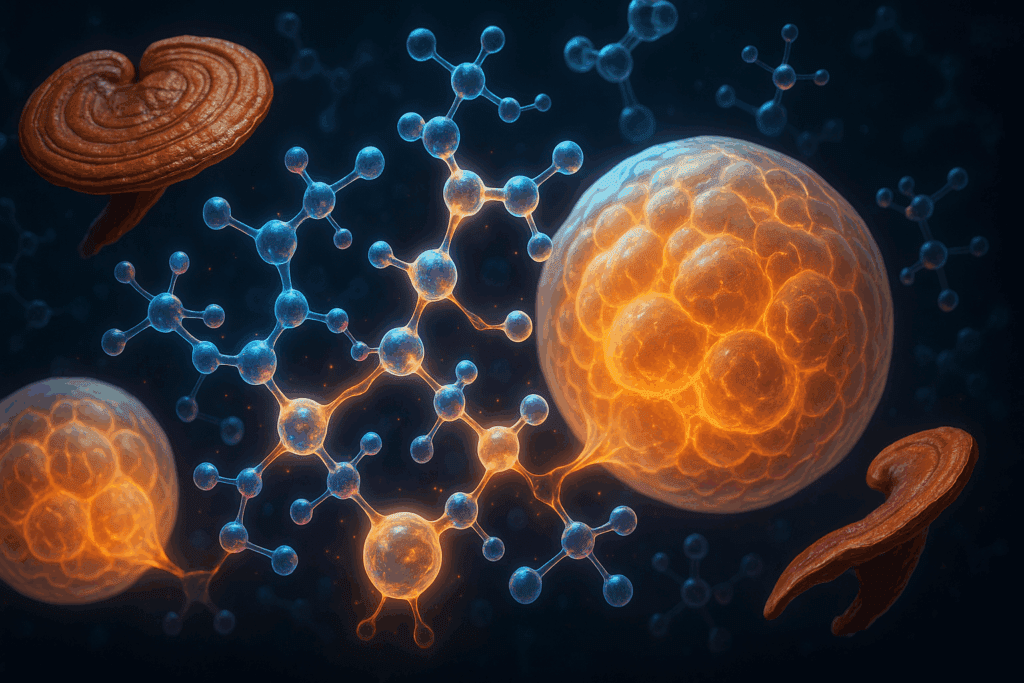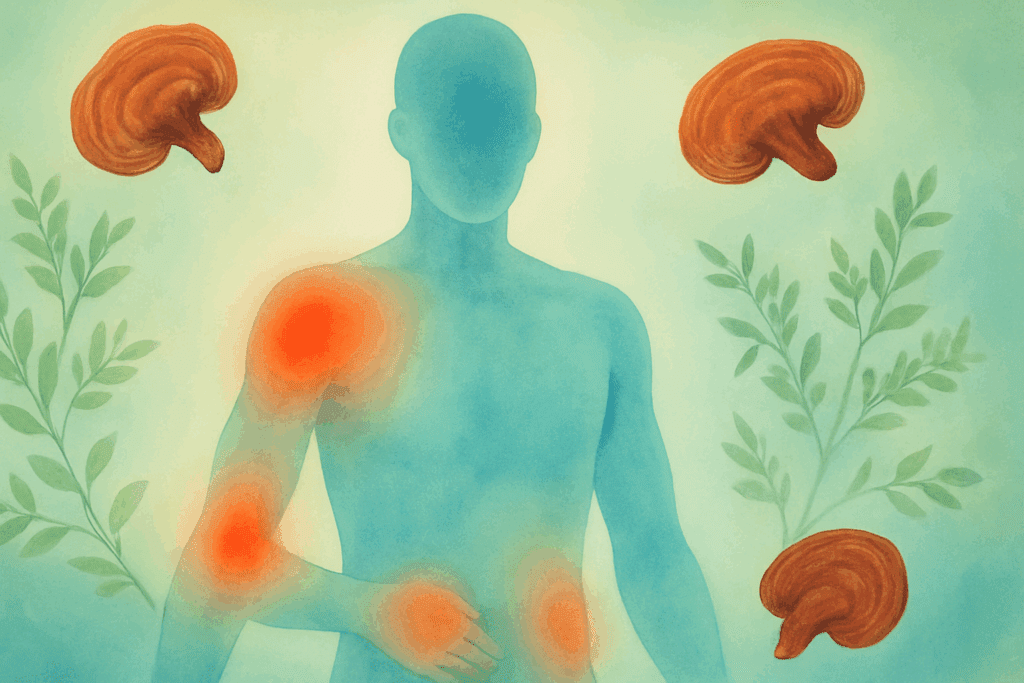The journey toward optimal health is paved with countless dietary and lifestyle choices, and increasingly, ancient remedies are finding their place in modern wellness routines. One area drawing considerable attention today is the relationship between reishi and weight loss. Known for centuries as the “mushroom of immortality,” reishi, or lingzhi, is revered not only for its longevity-enhancing properties but also for its profound impact on stress, anxiety, and metabolic function. This article explores the multifaceted ways reishi mushroom supports physical and emotional health, particularly its role in weight management, all while grounding its insights in evidence-based, medically accurate information.
You may also like: The Essential Guide to Reishi Mushroom Benefits: How to Use Reishi Mushroom Powder for Stress Relief and Adaptogenic Support

Understanding Reishi: The Ancient Mushroom with Modern Relevance
Reishi, scientifically known as Ganoderma lucidum, has occupied a respected place in Traditional Chinese Medicine (TCM) for more than 2,000 years. It has been used to promote vitality, resilience, and emotional stability. Although traditionally consumed as a bitter tea or powdered extract, today it is available in various formats, including capsules, tinctures, and even specialty coffee blends. Modern research reveals that the active compounds within reishi — notably polysaccharides, triterpenoids, and peptidoglycans — contribute to a range of health benefits. These compounds exhibit immunomodulatory, anti-inflammatory, and adaptogenic effects, making reishi a powerful ally in managing physical and emotional stressors. Understanding these biochemical constituents is essential to appreciating the powerful connection between reishi and weight loss, stress modulation, and overall wellness.

How Stress Impacts Weight: The Hidden Barrier to Weight Loss
In today’s fast-paced world, chronic stress has become a silent saboteur of health goals, particularly those related to weight management. The body’s stress response, primarily mediated by cortisol, triggers a cascade of metabolic changes that encourage fat storage, particularly around the abdominal area. Elevated cortisol levels can also drive cravings for high-calorie, nutrient-poor foods, further compounding weight gain. Sleep disturbances, often a byproduct of chronic stress, disrupt hormonal balance, impair glucose metabolism, and weaken willpower. Recognizing that weight management is intricately tied to emotional resilience, not just caloric balance, underlines the necessity of comprehensive, stress-mitigating strategies. Reishi mushroom, as we will explore, offers critical support in this regard, positioning itself as an invaluable component of a holistic weight management plan.

Exploring the Mechanisms: Reishi and Weight Loss at the Biochemical Level
The conversation surrounding reishi and weight loss often centers on its adaptogenic and anti-inflammatory properties. Reishi supports the regulation of cortisol levels, thereby mitigating stress-induced weight gain. Beyond this, reishi appears to influence adipogenesis — the process by which preadipocytes mature into fat-storing cells. Some studies suggest that reishi compounds may inhibit the differentiation of these cells, helping to prevent the accumulation of new fat. Additionally, reishi’s polysaccharides have demonstrated potential in improving insulin sensitivity, thus promoting more efficient glucose metabolism. Better glucose regulation not only supports weight loss but also enhances energy levels and cognitive function, creating a positive feedback loop for overall health. The implications of these biochemical effects are vast and underscore why reishi continues to garner scientific interest in the realm of metabolic health.
The Adaptogenic Nature of Reishi: Building Resilience Against Stress
Adaptogens are natural substances that enhance the body’s ability to resist physical, chemical, and biological stressors. Reishi is classified among the premier adaptogens for its capacity to restore equilibrium across various physiological systems. By modulating the hypothalamic-pituitary-adrenal (HPA) axis, reishi helps stabilize cortisol production and prevent the hormonal chaos that often accompanies chronic stress. Regular consumption of reishi may lead to improved emotional regulation, better sleep quality, and enhanced mental clarity. For those struggling with stress-related weight issues, building this adaptive resilience is crucial. Strengthening the body’s stress response enables more consistent adherence to healthy behaviors, from mindful eating to regular exercise, thereby creating an environment conducive to sustainable weight management.
Why Stress Relief Matters for Lingzhi Mushroom Weight Loss Benefits
When discussing lingzhi mushroom weight loss benefits, it is critical to highlight the importance of stress management. Chronic stress not only impairs metabolism but also undermines motivation, consistency, and self-discipline—three pillars essential for achieving and maintaining a healthy weight. Reishi’s adaptogenic qualities help break this vicious cycle by fostering emotional balance and psychological resilience. Furthermore, better stress management leads to improved sleep patterns, which in turn regulate appetite hormones like ghrelin and leptin. A stable emotional landscape allows individuals to make healthier dietary choices, stick to exercise routines, and recover more effectively from physical exertion. Therefore, the benefits of reishi extend far beyond simple metabolism; they penetrate deeply into the behavioral and emotional aspects of weight management.

Anti-Inflammatory Power: How Reishi Enhances Metabolic Health
Low-grade chronic inflammation is now recognized as a major driver of metabolic diseases, including obesity and type 2 diabetes. Reishi’s potent anti-inflammatory effects are mediated through various pathways, including the inhibition of nuclear factor-kappa B (NF-κB) and the modulation of cytokine production. By dampening systemic inflammation, reishi improves insulin sensitivity, enhances lipid profiles, and reduces oxidative stress—all critical factors in promoting metabolic health. The reishi and weight loss connection thus involves not only direct impacts on fat storage but also broader improvements in the underlying metabolic environment. Reducing inflammation can have cascading benefits across multiple organ systems, further solidifying reishi’s reputation as a holistic health enhancer.

Exploring Lingzhi Mushroom Weight Loss Effects Through Gut Health
Emerging research highlights the pivotal role gut microbiota plays in determining metabolic health, weight management, and even emotional well-being. Interestingly, reishi exerts prebiotic-like effects by promoting the growth of beneficial gut bacteria while suppressing harmful strains. A balanced gut microbiome enhances nutrient absorption, regulates blood sugar, and supports a healthy immune system—all critical for sustainable weight management. Studies on lingzhi mushroom weight loss mechanisms suggest that the mushroom’s influence on the gut environment may be a key pathway through which it exerts its metabolic benefits. Furthermore, improved gut health contributes to a stronger gut-brain axis, further supporting emotional resilience and cognitive function.
Practical Strategies for Integrating Reishi Into Your Wellness Routine
Incorporating reishi into your daily health regimen does not require radical lifestyle changes. Starting with a high-quality reishi supplement, ideally one standardized for polysaccharide and triterpenoid content, ensures you receive the most potent therapeutic benefits. Many individuals find success integrating reishi into their morning coffee or evening tea, allowing its calming effects to set the tone for the day or promote restful sleep at night. It is essential to maintain consistency, as adaptogenic benefits often accumulate over time. Monitoring your body’s response, particularly improvements in sleep quality, stress resilience, and weight management, can offer valuable insights into your personal journey with reishi.
The Science Behind Reishi and Weight Loss: A Critical Review
While anecdotal reports abound, it is crucial to examine the scientific rigor behind claims surrounding reishi and weight loss. Several animal studies have demonstrated that reishi supplementation can lead to reduced body weight, improved insulin sensitivity, and lower blood lipid levels. Human studies, although more limited, have echoed some of these findings, particularly in terms of stress reduction and improved metabolic markers. However, more large-scale, double-blind, placebo-controlled trials are needed to fully elucidate reishi’s weight loss mechanisms in humans. That said, the cumulative evidence from both traditional use and modern research strongly supports reishi’s role as a valuable adjunct in holistic weight management strategies.

Combining Reishi with Other Lifestyle Strategies for Maximum Impact
Reishi is not a silver bullet; rather, it functions best as part of a comprehensive lifestyle approach to health and weight management. Combining reishi supplementation with mindful eating, regular physical activity, stress-reduction practices like meditation or yoga, and sufficient sleep creates a synergistic effect that amplifies each component’s benefits. Addressing weight management through multiple interconnected pathways — metabolic, emotional, behavioral, and psychological — ensures greater sustainability and resilience. Integrating reishi into a holistic health plan acknowledges the complexity of human physiology and honors the ancient wisdom that true healing encompasses mind, body, and spirit.
Lingzhi Mushroom Weight Loss Results: What to Expect and How to Measure Success
Managing expectations is crucial when incorporating natural supplements into a health regimen. The lingzhi mushroom weight loss journey may not produce rapid or dramatic changes, but rather subtle shifts in energy, mood, cravings, and body composition over time. Tracking non-scale victories—such as improved sleep, enhanced mood, increased physical stamina, and decreased emotional eating—provides a fuller picture of reishi’s impact. Furthermore, success should be framed not only by aesthetic goals but also by improvements in overall vitality, resilience, and quality of life. Understanding that the journey toward health is cumulative and multidimensional fosters a more sustainable, compassionate approach to wellness.
Potential Side Effects and Considerations for Reishi Use
Although reishi is generally considered safe for most individuals, it is essential to approach any new supplement with mindfulness. Some users may experience mild digestive upset, dizziness, or allergic reactions. Those taking anticoagulant medications or dealing with autoimmune conditions should consult with a healthcare provider before initiating reishi supplementation. As with any adaptogen, balance and moderation are key. Listening to your body’s signals, adjusting dosage as necessary, and choosing reputable, third-party-tested products will help ensure a positive and beneficial experience with reishi.
Frequently Asked Questions (FAQ) About Reishi and Weight Loss
How Does Reishi Specifically Influence Fat Metabolism?
Reishi interacts with fat metabolism through its impact on hormonal regulation and liver function. While the article discussed cortisol modulation, lesser known is reishi’s ability to enhance mitochondrial efficiency, which can increase the rate at which fat is oxidized for energy. Improved mitochondrial health means more calories are burned at rest and during exercise. Additionally, reishi appears to support bile production, which is essential for digesting and metabolizing fats efficiently. These mechanisms help explain why reishi and weight loss are often discussed together in holistic health circles.
Can Lingzhi Mushroom Weight Loss Benefits Extend to Appetite Control?
Beyond stress modulation, reishi influences neurotransmitter balance, particularly serotonin and dopamine pathways. Enhanced serotonin levels are associated with improved satiety signals, helping individuals feel full sooner and reducing the likelihood of overeating. Studies investigating lingzhi mushroom weight loss benefits suggest that this appetite-regulating effect could be one of the key mechanisms behind observed weight management improvements. Unlike appetite suppressants that can carry side effects, reishi offers a more natural, balanced approach without stimulating the central nervous system.
What Is the Ideal Dosage for Experiencing Reishi and Weight Loss Effects?
The optimal dosage varies based on the product’s concentration and extraction method, but studies often recommend between 1.5 to 5 grams of dried extract per day for metabolic support. It’s important to choose dual-extracted formulas standardized for polysaccharides and triterpenoids, as these compounds are most responsible for reishi’s bioactivity. Users seeking reishi and weight loss benefits should be prepared for a cumulative effect over weeks or months rather than expecting rapid changes. Patience, consistency, and quality sourcing are key elements to maximize outcomes.
Is There a Difference Between Red Reishi and Other Varieties for Weight Management?
Yes, there is a significant difference between reishi varieties. Red reishi, the most studied form, contains the highest concentration of triterpenes and polysaccharides, both crucial for metabolic benefits. Other types, like black or purple reishi, offer different properties but may not be as potent for weight-related outcomes. Individuals focusing on lingzhi mushroom weight loss strategies should prioritize red reishi to leverage the full spectrum of metabolic and adaptogenic advantages supported by research.
Can Reishi Be Used Alongside Other Adaptogens for Weight Loss?
Absolutely, and combining reishi with other adaptogens can create a synergistic effect. Herbs like ashwagandha, rhodiola, and holy basil complement reishi by further enhancing stress resilience, energy regulation, and fat metabolism. However, it’s crucial to introduce new adaptogens gradually to monitor individual tolerance and avoid overwhelming the system. Those pursuing reishi and weight loss benefits may find that a tailored adaptogenic regimen amplifies emotional stability and metabolic improvements, creating a stronger foundation for sustainable health changes.
How Long Should You Take Reishi Before Seeing Weight Loss Results?
Weight loss influenced by adaptogens like reishi tends to manifest subtly and steadily. Most users begin noticing changes in mood, energy, and appetite regulation within four to eight weeks of consistent use. Visible physical changes, particularly regarding fat distribution and muscle tone, typically emerge after three to six months. It’s essential to combine reishi supplementation with mindful lifestyle practices. Expecting rapid transformations may lead to disappointment, but understanding the gradual nature of reishi and weight loss journeys encourages long-term commitment and holistic success.
Are There Specific Times of Day Best for Taking Reishi for Weight Management?
Timing can influence the effectiveness of reishi supplementation. Many users report enhanced metabolic and emotional benefits when taking reishi in the morning to support cortisol regulation during the day’s stressors. Others prefer evening doses for improved sleep quality, which indirectly benefits metabolism. Dividing the dosage into morning and evening servings can provide round-the-clock adaptogenic support. For individuals exploring lingzhi mushroom weight loss approaches, personal experimentation with timing often reveals the best regimen for individual biochemistry.
Could Reishi Help with Weight Maintenance After Weight Loss?
Maintaining weight loss presents distinct psychological and physiological challenges, often related to metabolic adaptation and emotional fluctuations. Reishi’s ability to stabilize hormonal and emotional responses makes it an excellent tool not just for losing weight but also for sustaining results. Its continual support of insulin sensitivity and inflammation reduction creates an internal environment less conducive to weight regain. Therefore, reishi and weight loss should be thought of not only in terms of initiation but also in maintaining long-term health and resilience against relapse.
Are There Risks of Overdependence on Reishi for Weight Loss?
While reishi is generally safe, relying solely on it without addressing broader lifestyle factors can limit its effectiveness. Overdependence on any single supplement without supporting nutrition, exercise, and emotional well-being strategies risks creating unrealistic expectations. Additionally, high doses over long periods without medical supervision could theoretically impact liver enzymes, although this remains rare. Approaching lingzhi mushroom weight loss strategies with a comprehensive, balanced plan prevents misplaced reliance and maximizes health outcomes.
What Future Research Areas Could Expand Our Understanding of Reishi and Weight Loss?
The scientific community is beginning to explore reishi’s influence on epigenetics, the microbiome, and long-term hormonal regulation—all promising areas for understanding its full metabolic potential. Future studies could investigate individualized responses based on genetic markers or gut microbiota composition. Additionally, more human clinical trials focused specifically on weight outcomes are needed to solidify reishi’s role in evidence-based weight management protocols. As emerging data continues to build, the narrative connecting reishi and weight loss will likely evolve from anecdotal to firmly validated within integrative health practices.
Conclusion: Embracing the Transformative Power of Reishi for Stress Relief and Weight Management
In the intricate dance between mind and body, few allies are as uniquely equipped as reishi to promote resilience, balance, and metabolic vitality. The profound relationship between reishi and weight loss is a testament to the interconnectedness of emotional stability, metabolic health, and sustainable lifestyle practices. By addressing the root causes of weight gain—particularly stress, inflammation, and hormonal dysregulation—reishi offers a gentle yet powerful pathway toward improved well-being. As research continues to illuminate the diverse benefits of this ancient adaptogen, its relevance in contemporary health practices grows ever stronger. Whether sought for its emotional calming effects, metabolic support, or contribution to holistic healing, reishi remains a vital ally on the journey toward a more balanced, vibrant life.
In summary, embracing the regular use of reishi, combined with practical wellness strategies, provides a robust foundation for sustainable health transformation. In the context of the modern world’s incessant stressors and metabolic challenges, tapping into the centuries-old wisdom surrounding lingzhi mushroom weight loss represents not only a nod to traditional knowledge but a practical, scientifically-supported avenue for nurturing both body and spirit. As we continue to bridge ancient insights with modern science, reishi stands as a timeless beacon of health, guiding those who seek vitality, resilience, and holistic well-being.
Further Reading:
Mushroom used in Chinese medicine ‘slows weight gain’
Taking a supplement every day can help the body burn fat and speed up weight loss
